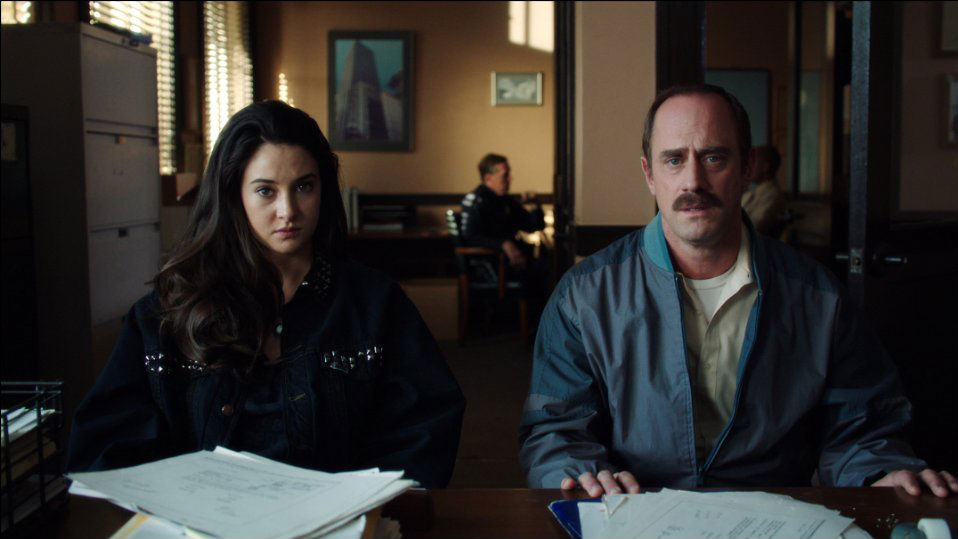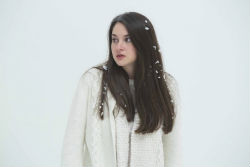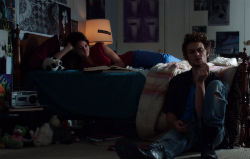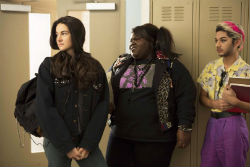It’s an updated reverse-role American Beauty—at least, that’s what I was led to believe for the first half-hour.
If there’s anything I remember from college American history classes, it’s the image attached to the idea of “everydayness”—white-picket-fence families taking comfort in conformity, relying on a cycle of working, eating, sleeping, saving (think Walker Percy’s The Moviegoer), and secretly suffering from a lack of substance. It’s a much-seen setting of the 50’s and 90’s, and it makes for great angst-ridden movies like American Beauty, the 1999 film about a comatose Kevin Spacey awakening from this cycle, triggered by his fascination with a cheerleader. Narrating from beyond the grave (as he explains at the film’s start), he can see the dissatisfaction, nervousness, and disillusionment of his daughter and wife.
Also, they literally have white picket fence around their secretly imperfect home.
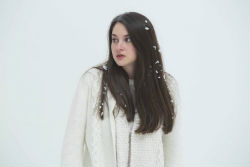 Magnolia Pictures
Magnolia PicturesNow imagine that American Beauty was rendered through the eyes of Spacey’s self-centered teenaged daughter. We’d probably see things only as they affected her, and the end would come as the shock it was not meant to be.
While Kat (Shailene Woodley) is almost nothing like Lester Burnam’s daughter, she does give us a familiar description of life at beginning of White Bird In A Blizzard (based on the novel by Laura Kasischke): “We’re pretending we’re this perfect little family living this perfect little life.” It’s also 1988.
What follows after the first bits should have been, by all appearances, another story of disillusionment and restlessness bred by everydayness. But whether or not you look beyond the self-absorbed main character, that’s not really what this story’s about.
Kat tells us she was 17 years old when her mother disappeared. Leading up to the day she left, Eve (Eva Green) envied her daughter’s youth and beauty, flirted with Kat’s boyfriend, and began to slip into insanity “thanks to the unbearable repetition and dullness of her daily life.” Kat’s father (Christopher Meloni) served as Eve’s doormat, vulnerable and sadly stifled, and even more pronouncedly so after her disappearance. Years later, Kat is still having strange dreams about encountering her mother in a snowstorm.
But her mother’s disappearance is not what preoccupies her thoughts. Actually, it’s striking how passively Kat reacts.
Throughout the days following her mother’s disappearance, she talks half-heartedly to a shrink about her dreams, but only because dad thought it would help. Other than that, it seems as though Eve’s vanishing barely registers with her, except for when she compares the evaporation of her mother to that of her own virginity (yes, she went there). She spends much of her time trying to get her boyfriend (Shiloh Fernandez) to have sex with her again (“I miss f***ing you” she whines into the phone, and in person, “Can we please stop talking and f***?”), but he’s failed to be the right kind of sensitive after the event. Unsatisfied with his lack of attention, she decides to seduce the detective in charge of looking for her mother, claiming to her pair of hopelessly hip friends that he’s (anatomically) the kind of man she needs.
If you’re kinda grossed out by the description above, you’re not alone, as I’m definitely in that boat. But what’s even more disturbing to me is that a lot of reactions to the film following Sundance Film Festival seem to miss the repulsiveness, including Woodley’s reaction herself. In an interview with Indiewire she talked about how Kat in White Bird differed so much from Amy in The Spectacular Now.
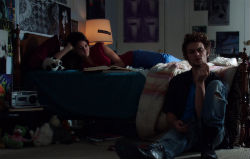 Sundance Institute
Sundance InstituteAbout Kat’s seduction of the detective, she said, "It's very rare in a movie that you see a woman chase a man, let alone a younger woman chase a man, not in a desperate way but in an empowered way. I thought that was really neat actually, and I love that about Kat, I love that she knew what she wanted, regardless of whether or not that was actually a healthy choice for herself, she knew what she wanted and she wasn't afraid to fulfill those desires.”
Maybe it’s not her fault that this is no Fault in Our Stars, but I’d heard this interview before seeing White Bird and was a little upset at what “empowered” turned out looking like. The story of the reckless teen girl who makes choices ignoring “whether or not that was actually a healthy choice for herself” is a tired trope that often ends with stardom—stories built this way tend to sell a few outright lies.
Unlike most flicks of this ilk, however, all talent present here is dazzling. Fernandez is pitch-perfect, far more tantalizing than the brainless-piece-of-eye-candy caricature he might have been. Kat’s two friends (Gabourey Sidibe and Mark Indelicato) accent her Ugh-My-Parents mantra and tell us exactly who she thinks she is. Christopher Meloni is hapless and vacant one moment, puppyish and genial the next. And best of all, eerie and erratic, Eva Green’s lurky richness captures every scene she appears in and haunts the rest.
If this was just a tale of burgeoning sexuality minus the mystery, the whole thing would be condemned to the miserable teen dream-pop genre, with Kat being a goth-clad antithesis of Tris from Divergent. But if you’ve ever seen anything else by Gregg Araki, you should be prepared that everything’s about to morph into much more than what the narrator initially feeds you.
White Bird is actually a slightly tamer film than some of his previous efforts (Mysterious Skin with Joseph Gordon-Levitt, 2010’s Kaboom), but his brushstrokes are all over it. A recurring element of Araki work is a series of camera shots that look straight into the faces of characters during wordless moments. In Mysterious Skin they are gut-wrenching; in Kaboom they’re tangy and a little awkward; in White Bird, they’re beautiful—they even give you small clues.
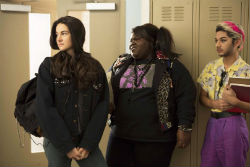 Magnolia Pictures
Magnolia PicturesAnd then there’s the soundtrack. Even when it’s no longer 80’s artists like “The Cure” playing in Kat’s headphones, the score fits with that psychedelic vibe (composed by Robin Guthrie, who did almost all of Araki’s previous soundtracks and Peter’s Jackson’s The Lovely Bones). Guthrie constructed a musical world that floats along in stark contrast to the harsh reality of the characters in it. The lyricless backdrop is pure summer heat and haze, pulling you into a thick warm trance as smilingly unfocused as Kat’s therapy sessions.
But most of all, Araki has a penchant for characters who have to come to terms with themselves in some way. And that is what redeems this ultimately dark mystery surrounding Kat.
It’s strange how much we trust the explanations of a voiceover (this goes for Gone Girl too). Maybe it’s because movies like American Beauty and some of its predecessors have made us comfortable with omnipresent narrators. But Kat’s coming-to-terms allows her (and us) to take a step back and see all that she’s missed, and when she does, a particular message hits home. So what is that message?
The only keen character says the only really true statement found in the film’s dialogue: “People are capable of doing horrible, unimaginable things to each other.” This is a harsh and primary fact. Absorbed deeply in fascination with the unfolding of your own story, you will miss when it’s happening right in front of you.
Beware of putting yourself at the center of the story.
Caveat Spectator
Fans of Shailene Woodley’s strictly PG action/adventure characters should not see this one.
Woodley appears topless three times throughout the film, all briefly. Thematically, a teen girl seduces a 40-something man, which we don’t see much of. Two teens have sex and appear fully nude; you only see them from the side. A few other characters end up in bed together but are not fully displayed. Several characters cuss repeatedly. In her dreams, Kat sees a dead body and eerie images of Eva Green. Characters debate the occurrence of adultery, schemes, and murder.
Taylor Lindsay is a writer in New York City. She was an intern at Christianity Today Movies and contributes regularly to Indiewire.

